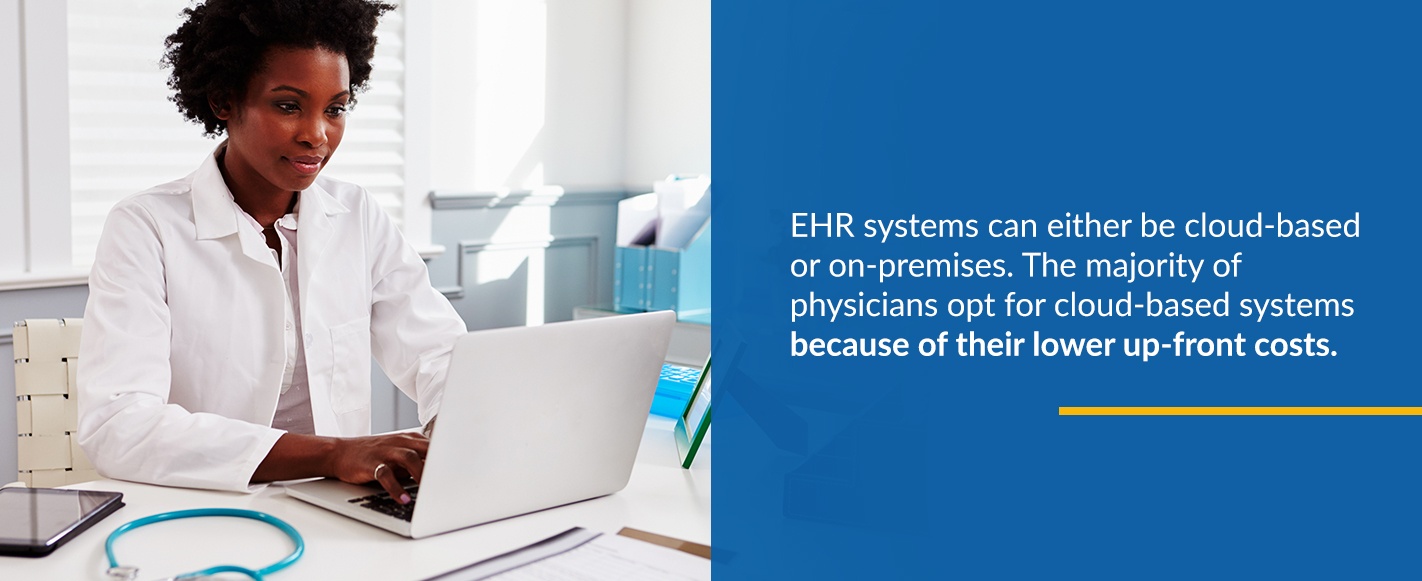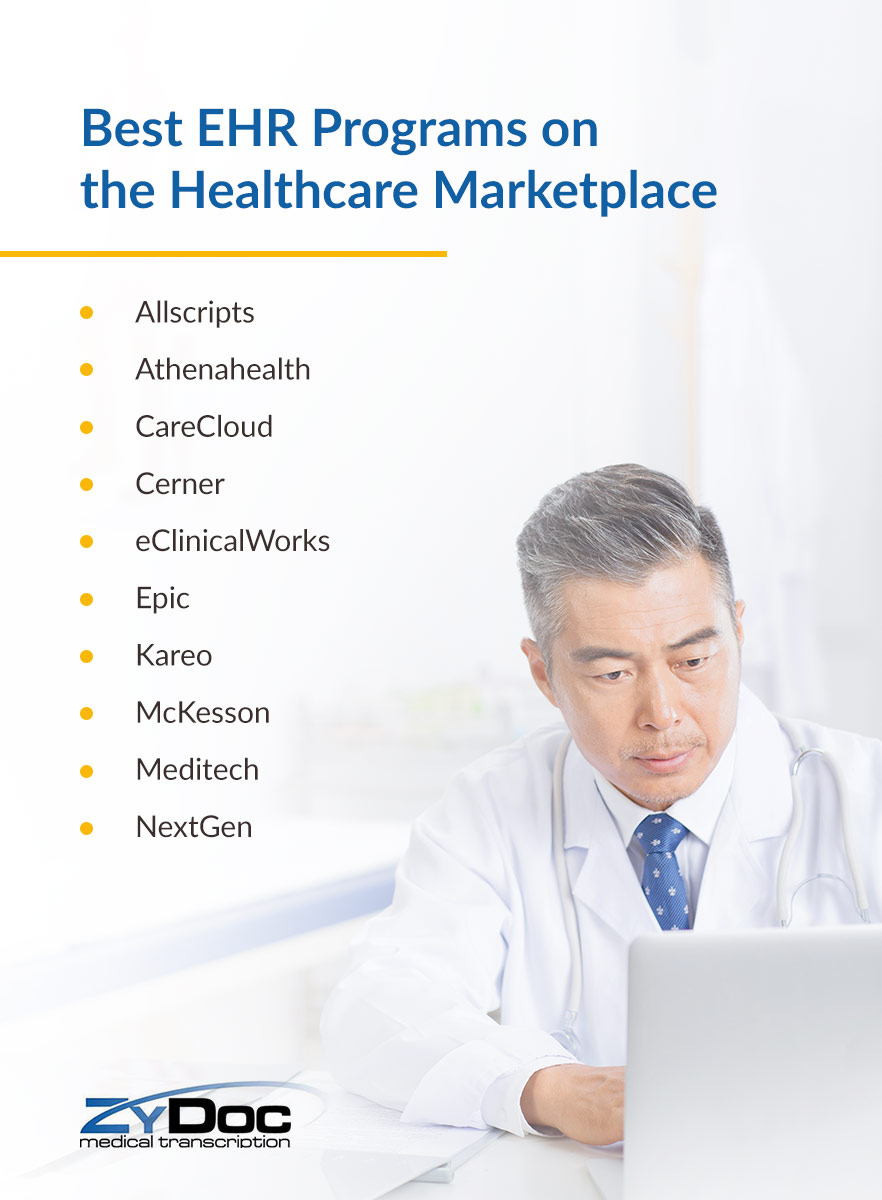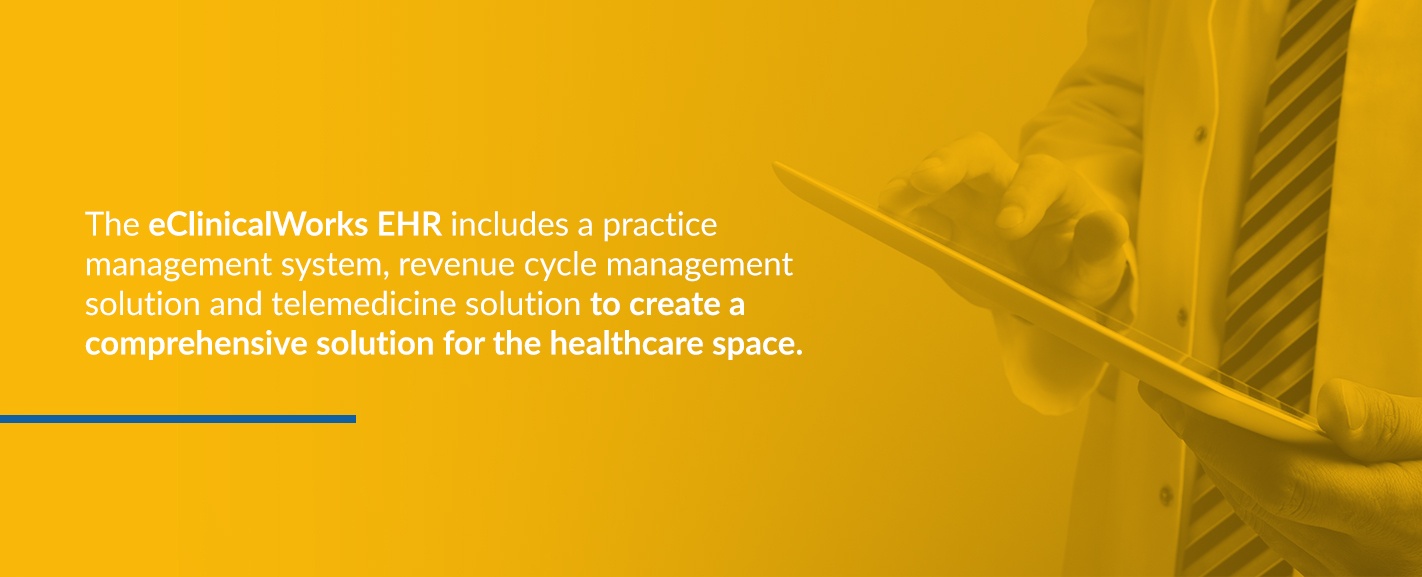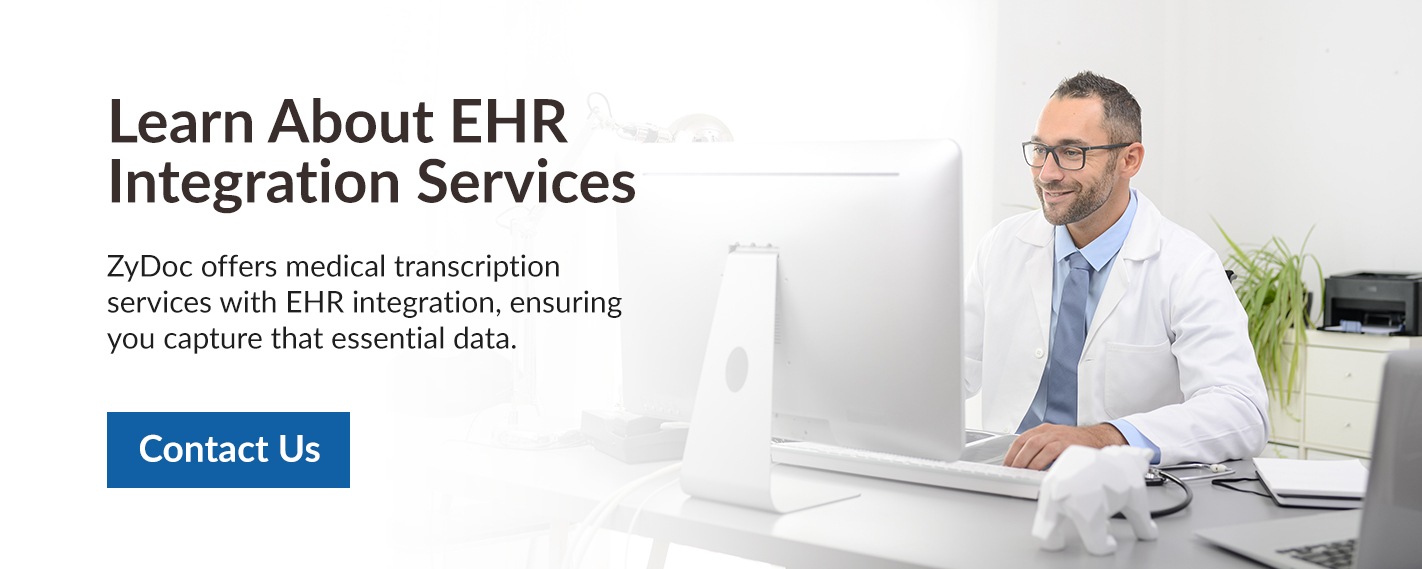Best EHRs on the Healthcare Marketplace
Jul 27, 2020 | Jonathan Maisel
About 96% of hospitals and 85.9% of office-based physicians use some type of electronic health record (EHR) system. The Centers for Medicare & Medicaid Services (CMS) have incentivized EHR adoption in healthcare through the Promoting Interoperability programs. With EHRs being nearly universal in healthcare, and their effective use tied to reimbursement, healthcare providers need to understand their options.
An EHR is a complex system that supports clinical documentation and workflow. The right system makes life easier for the teams using it, while other systems can lead to frustration and even burnout. What are the basics of a good EHR system? How can healthcare providers choose an EHR vendor, and what vendors dominate the marketplace? We’ll take a look at some of the best EHRs available to shed light on which software could be a good fit for you.
What Is an EHR?
The terms “EMR” and “EHR” are often used interchangeably, but they are two different things. An EMR, or electronic medical record, is a digital version of patient records. It contains all patient data and enables users to track that data over time.
An EHR has the same capability, but it offers more extensive functionality. An EHR is designed to allow greater continuity of care through data exchange. Users inside and outside of a healthcare organization can view and track clinical data. This means primary care physicians, specialists, pathologists and more can view and communicate about patient data. Patients themselves can also access information via an EHR.
EHRs are also an essential piece of workflow management for healthcare providers. Facilitating medication management, placing orders, generating reminders and managing scheduling are just a few of the additional features standard in EHR systems.
How to Choose an EHR
Nearly all healthcare providers have some sort of EMR or EHR. When choosing a platform today, the option is usually to upgrade the system with a current vendor or to change vendors completely. The best EHR programs serve the needs of individual providers, whether a physician’s office, ambulatory surgery center or hospital. When deciding which system is the best fit, consider:
1. Certification
When shopping for an EHR, it’s important to consider whether or not it meets the requirements set forth by the ONC Health IT Certification Program. The program is designed to support standard functionality and security criteria for EHRs.
By meeting the criteria, an EHR demonstrates a commitment to industry-wide standards and quality patient care. Adopting a certified EHR is critical for participation in the CMS EHR Incentive Program, also known as Meaningful Use. Failure to participate in this program can result in reduced Medicare reimbursement. When making a list of EHR must-haves, certification is one of the first considerations.
2. Cost
When looking for the best EHR system, budget remains an important factor. EHRs are designed to improve efficiency, but the team selecting the system still need to work within budget constraints and examine the return on investment (ROI) for an EHR.
Beyond the upfront cost of an EHR, providers need to account for the cost of any:
- Add-ons
- Installation fees
- Future updates
- Time spent onboarding and training users
Calculate the total cost and consider how long it will take to generate ROI. A typical practice will cover the cost of its EHR within about two and a half years.
3. Cloud vs. On-Premises

EHR systems can either be cloud-based or on-premises. The majority of physicians opt for cloud-based systems because of their lower up-front costs. Cloud-based EHRs do not require investment in hardware or new staff to maintain on-site hardware.
Costs will vary depending on the size and needs of the healthcare provider, but the average upfront cost for a cloud-based EHRis $26,000, compared to $33,000 for an on-premises EHR. However, the average yearly cost of a cloud-based EHR is $8,000, versus $4,000 for an on-premises system.
4. Security
Security is another consideration that is of vital importance in the healthcare industry. On-premises EHRs give physicians control over their own security, while the security of cloud-based EHRs is largely controlled by a third-party provider. If you’re not sure which choice is best for your facility, you may opt for a hybrid EHR, which uses both on-site servers and the cloud.
5. Ease of Use
Ease of use is one of the most important factors for the people utilizing the EHR during their daily practice. Clunky systems that don’t offer an intuitive interface can reduce efficiency and actively contribute to physician dissatisfaction and burnout.
When considering the ease of use of an EHR, ask the following questions:
- How simple is it to navigate the EHR features?
- Is the system easy to learn?
- Does the EHR fit naturally into clinical workflow, or does it hinder the workflow?
- Does the system fit the specific needs of your practice?
- Can you customize the system to add features that make workflow easier?
Ease of use is not the easiest quality to assess, especially if physicians and staff have never interacted with the system. When vetting potential vendors, ask for in-depth demonstrations to better understand how an EHR will fit into your workflow.
6. Implementation Process
An EHR needs to be implemented before healthcare providers can begin to take advantage of its efficiencies. Physicians need to spend time to prepare for the process, whether implementing an updated system or switching to another vendor’s EHR.
Clearly define the steps your organization needs to take to reach go-live and achieve Meaningful Use. What role will your vendor play in this process? Will they provide the support you need to achieve efficient and effective implementation?
Delayed and botched implementations regularly make headlines, so it is important for providers to understand their path going forward and how their vendor will a partner to make the process go as smoothly as possible.
7. Continuing Support
The best EHR software is backed by a vendor that builds a lasting relationship with the client. Once the implementation process is complete, the transitional journey is hardly complete. Team members will likely still be learning how to navigate the new system. Questions will also arise. Will the vendor be there to answer your questions and provide support? If something goes wrong, will the vendor help you troubleshoot? Customer service beyond the initial implementation and rollout phase is an important factor in the decision-making process.

Best EHR Programs on the Healthcare Marketplace
The healthcare marketplace has no shortage of EHR vendor options, each offering its own suite of features. With so many HIPAA-compliant, certified options on the market, which vendors sit at the top of the list? Some of the best EHR systems available include:
Allscripts
Allscripts focuses on serving small- and medium-sized physician practices, making them a strong contender for practices that are looking for a more customized solution. The company offers Allscripts Professional EHR for physician practices, while the Allscripts TouchWorks EHR serves ambulatory practices and larger, multi-specialty groups.
The company is often praised for having an open platform that supports advancement in population health and precision medicine. Allscripts started as an e-prescribing service, which means functionality remains a strong pro for this EHR. Additionally, Allscripts emphasizes partnering with its customers, rather than offering a one-size-fits-all approach.
Athenahealth
Athenahealth is a cloud-based EHR option. AthenaClinicals is focused on improving clinical efficiency, care coordination and faster documentation. Users can also access the EHR via the company’s mobile app: AthenaOne. Healthcare providers can review patient charts and customize their workflows on the app.
Athenahealth has won multiple awards from KLAS and Black Book. Customer Success Managers work with clients to ensure they feel supported, and the EHR is recognized for the number of third-party applications that can be integrated. The company is also big on disruption in the healthcare space. Its More Disruption Please (MDP) Network helps healthcare stakeholders share and develop ideas to change the healthcare experience.
CareCloud
As the name suggests, this EHR is cloud-based. CareCloud’s EHR includes its practice management system called CareCloud Central, charting capabilities and e-prescribing to create a comprehensive solution for healthcare practices. The company also offers:
- The CareCloud concierge revenue cycle management solution
- An analytics solution to help make the most of a practice’s data
- A patient portal
This EHR began as an option for smaller physician practices, but it is now a more robust solution that can serve larger practices as well. Ease of use is a significant focus of this EHR vendor.
Cerner
Cerner is a top EHR vendor. Notably, this EHR vendor signed a $10 billion contract with Veteran Affairs in 2018. The company’s EHR platform, Millennium, is implemented in both inpatient and outpatient settings. The company offers implementation support and support for continuous improvement.
This comprehensive platform can be deployed across large health systems that include multiple hospitals, physician offices and other facilities. Major health systems, such as Tenet Healthcare and Dignity Health, have gone through major Cerner EHR rollouts. Cerner also has a high level of integration with other health IT solutions.
eClinicalWorks

The eClinicalWorks EHR includes a practice management system, revenue cycle management solution and telemedicine solution to create a comprehensive solution for the healthcare space. It has undergone a number of iterations, with eClinicalWorks V11 as the current version on the market. It offers support for population health and patient engagement initiatives. Plus, the EHR comes with a virtual assistant: Eva.
The company began with a focus on the ambulatory setting, but its solutions are now used in a wide variety of healthcare environments. The platform has a high level of opportunity for customization.
Epic
Epic is one of the biggest names in the EHR business. As of 2017, nearly 100,000 ambulatory healthcare professionals had adopted certified Epic technology. Epic holds patient records for nearly half of the people in the United States. Big names in the industry, like Mayo Clinic and Johns Hopkins Medicine, have implemented the Epic EHR.
The comprehensive Epic platform has many software solutions covering different specialties, as well as:
- Revenue cycle management
- Telemedicine
- Managed care
- Population health
- And more
Epic touts interoperability as one of its top selling points. With such wide implementation in the healthcare space, it is nearly impossible to talk about EHRs without talking about Epic.
Kareo
Kareo is another EHR vendor tailored to smaller physician practices. The company’s cloud-based EHR, Kareo Clinical, was designed by healthcare providers and offers users a dedicated Success Coach. The intuitive system can configure to an individual practice, connect with billing and facilitate e-prescribing. Its comprehensive dashboard can also be leveraged for various reporting functions. Kareo offers pricing tailored to each practice’s needs.
McKesson
McKesson, like many other leading EHR vendors, is not focused solely on health IT solutions. The company is also a leading pharmaceutical and supplies distributor. The company offers both cloud-based and on-premises options.
This platform incorporates both practice management and billing functions. McKesson also focuses on providing solutions for specialty practices. For example, oncology practices can use iKnowMed, designed specifically for that specialty.
Meditech
Meditech offers both on-premises and cloud-based technology. This EHR vendor caters mostly to hospitals that are considered small or medium-sized. Meditech Expanse emphasizes the importance of continuity of care. The system handles all manners of necessary functions, including documentation, patient communication and revenue cycle management. Meditech also offers 24/7 customer support.
NextGen
NextGen’s EHR is built for ambulatory practices of varying sizes. The system is known for its customizability and the improvement of workflow efficiency. NextGen’s EHR has been specifically made with the clinician’s perspective in mind. It incorporates practice management support and a suite of financial features, including revenue cycle management. Though it is known for its ease of use, taking advantage of all this EHR has to offer may take users some time.
Discover ZyDoc’s EHR Documentation Services
Even the best EHR is limited in what it can do if the quality of clinical data it stores is poor. Capturing clinical data is a core component of using EHRs correctly. This data populates the patient record, supporting quality and a continuum of care. It is also essential to accurate billing for services rendered, and it is an important research and teaching tool.
ZyDoc offers medical transcription services with EHR integration, ensuring you capture that essential data. We have the technology available to integrate with all EHRs, like Allscripts, Epic, Cerner and more. Learn how we help physician offices, hospitals and ambulatory surgery centers capture the data they need to provide their patients with high-quality care. Start a free trial today and contact us to discuss plan options that may be right for you.

